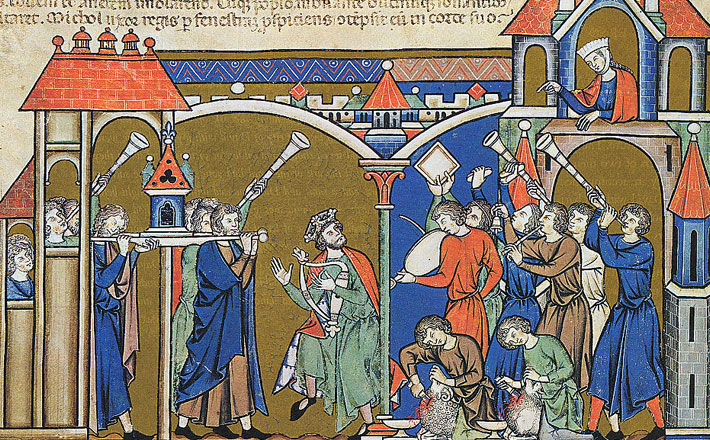Commentary on 2 Samuel 6:1-5, 12b-19
If the last two weeks of the study of David’s consolidation of his reign are any indication, the new king certainly wore his emotions on his sleeves — well, when he was wearing sleeves, that is.
And David’s emotions certainly run the gamut in this text.
The passage recounts the transition of the Ark of the Covenant from its resting place at Baale-judah, in the house of Abinadab, to the newly captured City of David, Jerusalem. Abinadab’s sons, Uzzah and Ahio carried the Ark on a “new cart,” a fact that was repeated twice in 2 Samuel 6:3, perhaps to indicate the pride David felt in transporting the Ark to his new capital. The Israelites had not managed to utilize the Ark in religious practice since the sons of Eli — Hophni and Phineas — tried to manipulate its supernatural power in a battle against the Philistines (see the crazy tale of the Ark’s adventures in 1 Samuel 4-6).
As they paraded the Ark towards its destination, David and the Israelites “danced” before it, playing all sorts of musical instruments. The verb for dance here has a connotation of playfulness, sport, and reverie (2 Samuel 6:5). The lectionary assignment clearly emphasizes the joyfulness of this event.
But, again, the lectionary verses do not tell the whole story. In the midst of this celebratory parade, there is another tale of the Ark’s dangerous power. The events that surround this story also reveal a diverse range of David’s emotional responses to the situation, and even to God. As they were transporting the Ark, the ox rattled it, compelling Uzzah to reach out his hand and stabilize it, perhaps to keep it from tumbling on the ground (2 Samuel 6:6). The text reads that YHWH’s anger burned against Uzzah for touching the Ark, and God immediately struck him down (v. 7).
We could ask many theological questions about this part of the story, its inclusion in the canonical text, and its exclusion from the lectionary reading. Perhaps, like David, we are angry at God for killing Uzzah for no apparent reason (2 Samuel 6:8). Perhaps we think it a bit harsh or unfair that God would strike someone down for attempting to rescue the Ark from touching the ground. Perhaps we would rather just ignore this bit of the text and concentrate on David’s celebration that continues in verse 12. Or, perhaps, we would rather ignore this piece of the text because those of us in mainline Protestant traditions would rather focus on the approachability of God in worship than God’s dangerous otherness that we see in this and other texts related to the Ark of the Covenant.
The incident prevailed upon David, whose fear motivated him to question his own ability to care for Israel’s holy relic: “How can the ark of the LORD come into my care?” (2 Samuel 6:9). David moved from anger at God for striking Uzzah, to fear of God, to a period of self-doubt that lasted three months (v. 11). Only after David hears how YHWH blessed Obed-Edom, at whose house the Ark remained, does he resume its triumphant procession to Jerusalem.
His confidence revived, David performed several functions reserved primarily for priestly factions: the wearing of an ephod (and apparently the ephod alone, according to Michal in 2 Samuel 6:20), performing sacrifice, and constructing a tent to house the ark. Likewise, in ritual fashion, David blessed all the people of Israel (v. 18) and fed them (v. 19).
Like many of the strange stories of David’s first few years as king, this narrative plunges us into uncharted territory. On the one hand, we learn of David’s great joy and celebration of the gifts he believed God had bestowed upon him. On the other hand, this text reminds us of the dangerous volatility of Israel’s God, YHWH, a God whom David both scorned and feared after the death of Uzzah, whose intentions in reaching out to stabilize the ark we may never know.
As the reader, we also learn that David’s celebration did not please everyone in Israel. The text suggests that David’s wife, Michal, despised David for his actions, which she viewed as shameful (2 Samuel 6:16). Again in a verse that goes beyond the limits of the lectionary reading, Michal elaborates on her distaste for David’s show. While David meant for his parade to solidify his leadership as king, Michal suggests that he exposed himself as any mere commoner might do (v. 20).
In response to Michal’s rebuke, David reveals a self-awareness of his shadow side. While he intended his display to be in praise and response to God, he claims that he will also always seek the favor of his subjects. “I will make myself yet more contemptible than this, and I will be abased in my own eyes; but by the maids of whom you have spoken, by them I shall be held in honor.” I have always respected Michal for calling David on his antics. While everyone else around him lavished praise upon him, she saw the hints of his shortcomings. David, it appears, did not share my sentiment, and the last we hear of his relationship to Michal is that they never had a child. While the text never explicitly tells why, one could easily assume that their marriage remained a mere formality that would insure no rival from the line of Saul for David’s other sons.
In this text, we see a volatile God, a rebuking queen, and an emotional king. God’s anger at Uzzah is paradoxically puzzling but straightforward. Michal’s contempt for David rings crystal clear. David, for his part, has a variety of emotions: joy, anger, fear, renewed confidence, pride, and even contempt. While many of the details of this text may seem foreign to postmodern ears, these emotions can provide a touchstone for interpretation. We can relate to these emotions because they are all so recognizable in ourselves and in those with whom we interact. Even as we struggle to understand the actions of these three characters in the text, we wrestle in our relationships with one another and ourselves.


July 12, 2015